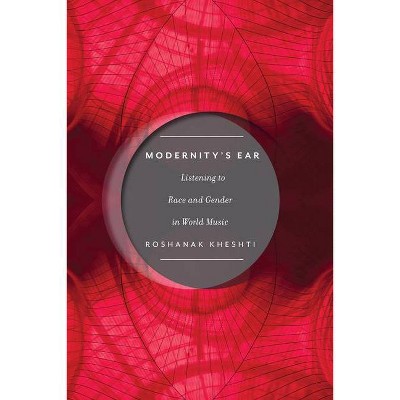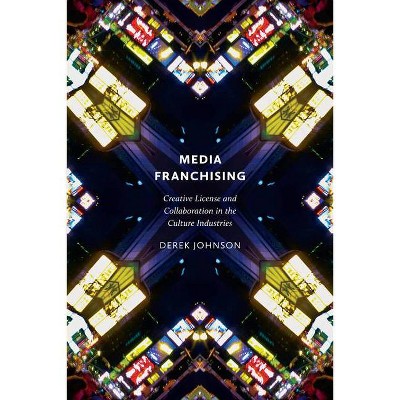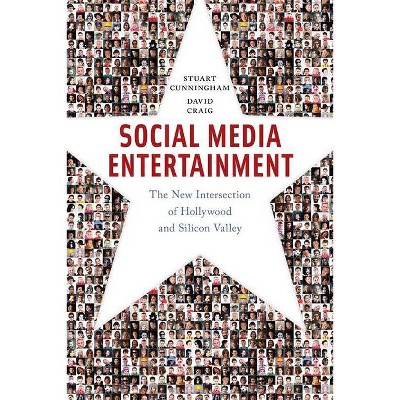Modernity's Ear - (Postmillennial Pop) by Roshanak Kheshti (Paperback)

Similar Products
Products of same category from the store
AllProduct info
<p/><br></br><p><b> About the Book </b></p></br></br>"Fearing the rapid disappearance of indigenous cultures, twentieth-century American ethnographers turned to the phonograph to salvage native languages and musical practices. Prominent among these early "songcatchers" were white women of comfortable class standing, similar to the female consumers targeted by the music industry as the gramophone became increasingly present in bourgeois homes. Through these simultaneous movements, listening became constructed as a feminized practice, one that craved exotic sounds and mythologized the 'other' that made them. In Modernity's Ear, Roshanak Kheshti examines the ways in which racialized and gendered sounds became fetishized and, in turn, capitalized on by an emergent American world music industry through the promotion of an economy of desire. Taking a mixed-methods approach that draws on anthropology and sound studies, Kheshti locates sound as both representative and constitutive of culture and power. Through analyses of film, photography, recordings, and radio, as well as ethnographic fieldwork at a San Francisco-based world music company, Kheshti politicizes the feminine in the contemporary world music industry. Deploying critical theory to read the fantasy of the feminized listener and feminized organ of the ear, Modernity's Ear ultimately explores the importance of pleasure in constituting the listening self." -- Publisher's description<p/><br></br><p><b> Book Synopsis </b></p></br></br><p><b>Inside the global music industry and the racialized and gendered assumptions we make about what we hear </b></p><p>Fearing the rapid disappearance of indigenous cultures, twentieth-century American ethnographers turned to the phonograph to salvage native languages and musical practices. Prominent among these early "songcatchers" were white women of comfortable class standing, similar to the female consumers targeted by the music industry as the gramophone became increasingly present in bourgeois homes. Through these simultaneous movements, listening became constructed as a feminized practice, one that craved exotic sounds and mythologized the 'other' that made them.</p><p>In Modernity's Ear, Roshanak Kheshti examines the ways in which racialized and gendered sounds became fetishized and, in turn, capitalized on by an emergent American world music industry through the promotion of an economy of desire. Taking a mixed-methods approach that draws on anthropology and sound studies, Kheshti locates sound as both representative and constitutive of culture and power. Through analyses of film, photography, recordings, and radio, as well as ethnographic fieldwork at a San Francisco-based world music company, Kheshti politicizes the feminine in the contemporary world music industry. Deploying critical theory to read the fantasy of the feminized listener and feminized organ of the ear, Modernity's Ear ultimately explores the importance of pleasure in constituting the listening self.</p><p/><br></br><p><b> Review Quotes </b></p></br></br><br>Engaging an impressive range of methodologies, Modernitys Earoffers an astute look into the world music culture industry through the lens of ethnographic entrapment and phonographic subjectivity. With sharp insight, Kheshti explores the nexus between bodies and sounds at the intersection of racial and gender identities to make a crucial point about phonographic listening as an important venue for performative and philosophical reflection.--Alexander Weheliye, author of Phonographies: Grooves in Sonic Afro-Modernity<br><br>In this tightly structured book, Kheshti offers not only an aesthetic and stylistic history of world music but also an analysis of race and gender in the & world music culture industry.-- "Choice"<br><br>Rich in ethnographic fieldwork, Modernitys Earis a thunderous unsettling of the gendered and racialized assumptions we make about sound and listening. Innovatively pushing the limits of queer studies and critical race studies, Kheshti stretches the listening ear and retunes theoretical approaches to consider not only the way race sounds but how it is configured as sensually & other. A field-changing book for queer studies and sound studies alike.--Deborah R. Vargas, author of Dissonant Divas in Chicana Music: The Limits of La Onda<br>
Price History
Cheapest price in the interval: 26 on November 8, 2021
Most expensive price in the interval: 26 on December 20, 2021
Price Archive shows prices from various stores, lets you see history and find the cheapest. There is no actual sale on the website. For all support, inquiry and suggestion messagescommunication@pricearchive.us




















